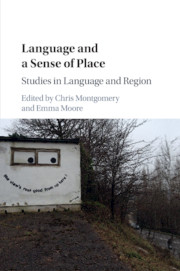Introduction
‘Place’ in Studies of Language Variation and Change
Published online by Cambridge University Press: 13 July 2017
- Type
- Chapter
- Information
- Language and a Sense of PlaceStudies in Language and Region, pp. 1 - 12Publisher: Cambridge University PressPrint publication year: 2017
References
- 1
- Cited by



